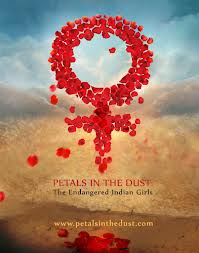Valuing Life: Spotlighting the Crisis of Girls in India
Apr 24th, 2013 | By admin | Category: Social JusticeBy Suzanne York, www.howmany.org
It’s a subject that few want to discuss, but one of paramount importance. It is the topic of violence and discrimination against girls (including child marriage), which is occurring with increasing frequency.
In India, the past few months have brought increased attention to gender violence, based on some horrific, yet sadly not uncommon, acts of violence toward women and girls.
One woman is trying to end this violence by shining a light on it through film. Nyna Pais Caputi is an Indian filmmaker who has just completed a documentary called Petals in the Dust: The Endangered Indian Girls. It will address the discrimination, violence, and murder (gendercide and infanticide) of millions of Indian girls and women. The official goal is “to create awareness and initiate dialogue around violence against women, not just in India but globally, and spur people into getting involved and taking action.”
Awareness and action are the keys to ending the violence, oppression, and child marriages. Despite the depressing statistics, it is time to confront reality and improve the lives of girls in India and around the world.
Last week Ms. Caputi gave a talk at the Commonwealth Club in San Francisco. She said that in the last century, 50 million girls have been eliminated from India’s population. The latest Indian census (2011) found that the country’s gender ratio is 914 girls to 1,000 boys. And though it is illegal in India to reveal the sex of a baby during an ultrasound, nevertheless 10 million girls have been selectively aborted in the past two decades. India is also reported to be the fastest-growing country for ultrasound machines.
This is not a problem that can be blamed on economic status or education, at least in India. A study published in the journal Lancet found that Indian women from wealthier households and better educated families were far more likely than poorer women to abort a girl (emphasis added).
Why is Violence Against Girls Tolerated?
In a country that worships goddesses and has had female prime ministers, why this violence toward females? The cases of infanticide are well-documented (i.e. poisonings, drownings), as is post-natal discrimination against girls (i.e. starvation, feeding them less nutritious foods, not giving them medicines). Ms. Caputi noted that dowry deaths are worsening, and quoted a statistic that every 90 minutes a bride is burned in India. The cruelty continues, unabated.
Some of the reasons given for discriminating against women and girls are dowry, wedding expenses, caring for aged parents (sons take care of their parents while brides go off with the husband’s family), and the cultural preference for sons.
Putting Girls First
Cultures and cultural practices can and do change, sometimes faster than we realize. For now, the violence is happening across religions and even in Indian communities outside of the country, such as Norway and Wales. The roots of violence against women and girls lie in persistent discrimination.
In Ms. Caputi’s opinion, some possible ways to end violence against girls include providing free education for girls, strict enforcement of laws banning sex selection and the practice of dowry, education on gender violence and gender equality, and teaching women how to respect themselves, be empowered, and learn to stand up for their rights.
To put an end to gendercide and violence, it is crucial that men learn to value and respect women; education for men must also be prioritized.
A Voice From the Grave
Perhaps the most powerful voice for change, included in the documentary, comes from a woman who was almost murdered because she was born a girl. Sunita Aralikar was buried alive by her father when she was just 2 weeks old, and thankfully was rescued by her grandfather. Today she is an advocate for women’s rights, leading the fight against infanticide, dowry, casteism, and other injustices.
Sunita represents hope and change. We can’t change what isn’t acknowledged and talked about openly. When Petals in the Dust is released later this year it will open up an opportunity to do just that.
Suzanne York is a senior writer with the Institute for Population Studies

